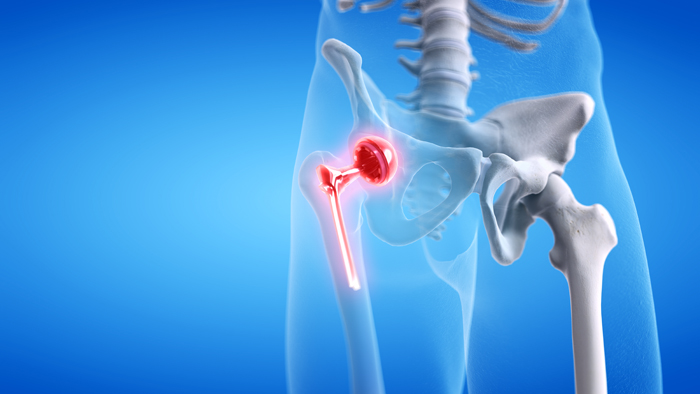Hip Replacement surgery in Tardeo, Mumbai
Orthopaedic hip replacement is a surgery in which doctors replace parts of damaged hip joints with prosthetics. This greatly relieves pain and improves mobility. Hip replacement surgery is a very common operation performed and is highly successful. To know more about Hip Replacement surgery search for orthopaedic hospitals near me or orthopaedic hospitals in Tardeo, Mumbai.

What Is Orthopaedic Hip Joint Replacement?
The hip joint is a ball-and-socket joint which means that one ball-shaped bone fits into the cup-like depression of another socket-shaped one. In hip replacement surgery, the ball known as the femoral bone is replaced with a metal stem. The metal stem is placed inside the hollow of the femur bone and then a metal ball is placed on top of it. Similarly, the damaged socket known as acetabulum is replaced by a metallic socket. This process provides relief from a painful hip joint and also facilitates mobility.
What are the Causes Of Hip Joint Replacement?
There are certain conditions which might require a hip replacement surgery. These are:
- Osteoarthritis- This condition causes wear and tear of the tissues and cartilage, and prevents the smooth movement of bones and joints.
- Rheumatoid Arthritis- In this, inflammation occurs that damages the bones, cartilages and causes pain.
- Osteonecrosis- An injury to the hip joint may cause a reduction in the blood supply to the femoral bone. This lack of blood causes arthritis and may lead to hip replacement surgery.
- Childhood Hip disease- Sometimes hip diseases caused in children are resolved but they may develop a chance of getting arthritis in later part of life. This usually happens when the hip bones do not grow normally.
All these conditions pose a person to a greater chance of hip joint pain. This is treated by undergoing hip joint replacement surgery.
What are the Symptoms of Hip Joint Pain?
The various symptoms which are an indicator that you might need a hip joint replacement surgery are:
- Severe pain in the hip which causes difficulty in daily activities like walking or bending.
- Pain in the hip while resting or lying down.
- Stiffness in the hip.
- Not much relief in pain from taking anti-inflammatory medicines and steroids.
Mostly people over 50 years of age require hip replacements but it has been performed in younger patients as well. So, it is best to consult a doctor regarding whether you need it or not.
What are the Necessary Preparations before the Surgery?
Before undergoing hip replacement surgery, it is necessary to get an evaluation done. Your doctor will ask about your previous medications and medical history. The doctor might examine your hip joint and its range of motion and strength of muscles.
You might be given a hospital gown to wear and an anesthetic to numb your lower body.
What is the Procedure and how do the doctors Proceed with the Treatment?
The entire surgery takes a few hours to complete. During the surgery, the doctor will make an incision in the side or front of your hip. The diseased parts will be removed and replaced with prosthetics. The techniques for hip replacement are constantly evolving which reduces the recovery time and pain.
After the surgery, you will be shifted to a recovery room until the effect of anesthesia wears off. Most patients go home the same day or in 1-2 days. In the hospital, doctors will monitor your blood pressure, pulse, and comfort level.
What are the Risks Involved?
The risks associated with hip replacement surgery are:
- Blood Clots- There is a huge risk of developing blood clots in veins of the leg after the surgery. These clots may break off and travel to the heart, lungs, or brain which might cause serious trouble. So, the doctor might prescribe blood-thinning medicines.
- Infection- infections can occur at the site of surgery and doctors give antibiotics to treat it.
- Change in leg length- Sometimes the surgery may lead to one leg longer than the other.
- Nerve Damage- The surgery may also cause nerve damage such as numbness, weakness, or pain.
- Dislocation- The hip might dislocate in the first few months of surgery and you might need to consult the doctor again.
When should you see a doctor?
If you start experiencing severe hip pain and difficulty performing day-to-day activities, you should consider consulting a doctor. Also, after the surgery, if there are any complications or blood clots it is advised to consult a doctor. Search for orthopaedic hospitals near me or orthopaedic hospitals in Tardeo, Mumbai.
You can also Request an appointment at Apollo Spectra Hospitals, Tardeo, Mumbai
Call 1860 500 2244 to book an appointment.
What recovery steps should you take?
For a speedy recovery, certain things need to be taken care of. Physical therapy is a must after surgery. Also, make some modifications at home such as a raised toilet seat. And place items at waist length to avoid bending. These steps if taken care of provide more comfort and speeds up the recovery process.
Conclusion
Hip replacement surgery greatly improves the quality of life. You can expect relief in pain and increased mobility. You will be able to perform activities such as swimming, running, or riding a bike comfortably.
It takes around 4-6 months to move around without using side-walks. But complete recovery varies from person to person.
Yes, physical therapy is a must part of the recovery process and is necessary.
Symptoms
Our Top Specialities
NOTICE BOARD
CONTACT US
CONTACT US
 Book Appointment
Book Appointment


.svg)
.svg)
.svg)
.svg)








